Pope Francis


A prominent liberal cardinal who leads a body representing European bishops has called for “fundamental revision” in Catholic teaching on homosexuality, and said it is wrong to fire Church workers for being LGBTQ.
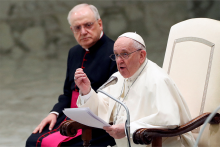
Pope Francis said on Wednesday that parents of LGBTQ children should not condemn them but offer them support. He spoke in unscripted comments at his weekly audience in reference to difficulties that parents can face in raising offspring.

FOR ARCHBISHOP JOSÉ Gomez of Los Angeles, social justice movements are “pseudo-religions.” In a November speech, Gomez said that “today’s critical theories” are “profoundly atheistic,” that they spring from a “Marxist cultural vision,” and that they “resemble” heresies in church history. He even blamed social justice movements for “causing new forms of social division, discrimination, intolerance, and injustice.”
Black Catholic theologians and others responded to Gomez’s remarks with a petition that read, in part, “Your speech was particularly painful and offensive to Black Catholic advocates in the United States who have organized for racial justice in the face of indifference and even hostility from many white Christians.” The National Black Sisters’ Conference pointed out that “BLM is not a pseudo-religion; nor is it a ‘dangerous substitute for true religion.’ It is a movement very much in the tradition of Catholic Social Teaching.” And someone ought to introduce Archbishop Gomez to Pope Francis who, in his message for World Youth Day this fall, encouraged young people to “Arise! Uphold social justice, truth, and integrity, human rights. Protect the persecuted, the poor and the vulnerable, those who have no voice in society, immigrants.”
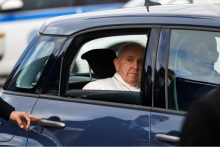
Pope Francis said on Monday he was willing to go to Moscow to meet Russian Orthodox Patriarch Kirill “brother to brother” in what would be the first trip by a pope to Russia.

Pope Francis said on Monday that migrants were being exploited as “pawns” on a political chessboard in an apparent reference to the crisis at the Belarus border.
Thousands of migrants are stuck on the European Union’s eastern frontier in what the EU says is a crisis Minsk (Belarus’ capital city) engineered by distributing Belarusian visas in the Middle East, flying them in and letting them go to the border.
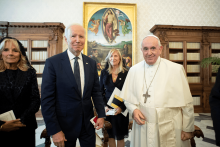
The two world leaders met behind closed doors to discuss “working together on efforts grounded in human dignity,” with Biden praising the pope’s advocacy in fighting climate change ahead of next week’s United Nations conference on climate change (COP26) in Glasgow, Scotland, according to a White House news release. During their meeting, Biden called the pope “the most significant warrior of peace I’ve ever met,” and gave the pope a “challenge coin” with the U.S. seal on the front. The president also made several jokes, about the two men’s ages, his own sobriety, and said it was “good to be back,” as he was greeted at the Vatican.
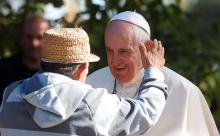
Speaking with an Argentine accent, amplifying the voice of the poor, indicting the rich, and betting it all on grassroots movements, we might even ask, do we finally have a liberation theologian in St. Peter’s chair?

The church had shown "deep, total and even cruel indifference for years," protecting itself rather than the victims of what was systemic abuse, said Jean-Marc Sauve, head of the commission that compiled the report.
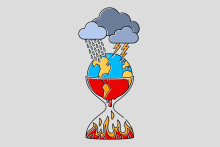
Religious leaders should stop saying things like, “We must be good stewards of Creation” or “Our faith teaches us to protect the Earth” and instead getting comfortable saying things like: “ExxonMobil, BP, Shell, and other oil and gas companies are systematically destroying the planet — and financial giants like JPMorgan Chase, Bank of America, Wells Fargo, BlackRock, and Vanguard are bankrolling the destruction.”

For the first time, the leaders of the Roman Catholic Church, the Eastern Orthodox Church, and the Anglican Communion came together to issue a joint statement.
In “A Joint Message for the Protection of Creation,” Pope Francis, Ecumenical Patriarch Bartholomew I, and Archbishop Justin Welby of Canterbury stressed that Christians need to take part in mitigating climate change. The statement urged individuals and public leaders to play their part in “choosing life” for the future of the planet, and warned of the urgency of environmental sustainability, its impact on poverty, and the importance of global cooperation.
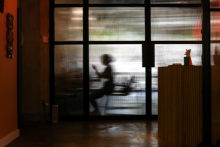
My brief attempt at recuperation from major surgery was not rest. Capitalism has taught us that rest is a cyclical but most importantly temporary state and that by optimizing our habits and schedules and bodies, we can actually require less of it. Abysmal leave policies in the United States have ingrained in us a quick-fix approach to medical crises, leaving those with chronic conditions and those who care for them behind.
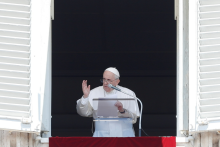
“Let us put a halt to the frantic running around dictated by our agendas. Let us learn how to take a break, to turn off the mobile phone,” Pope Francis said in his weekly address from a window overlooking St. Peter’s Square.
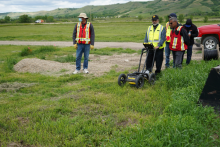
“I have spoken personally directly with His Holiness Pope Francis to press upon him how important it is not just that he makes an apology but that he makes an apology to indigenous Canadians on Canadian soil,” Trudeau told reporters in Ottawa.
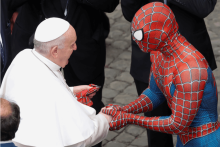
A different type of participant dropped in on Pope Francis' general audience at the Vatican on Wednesday: Spider-Man.
A man dressed in a full, skin-tight, red, black and blue costume of the comic book and film character — including head cover — sat in the VIP section of the audience in Vatican's San Damaso Courtyard.
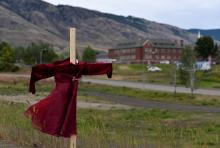
Indigenous leaders and school survivors on Sunday dismissed Pope Francis' expressions of pain at the discovery of 215 children's remains at a former Catholic residential school in Canada, saying the church needed to do much more.
In his weekly blessing in St. Peter's Square on Sunday, Francis said he was pained by the news about the former school for indigenous students and called for respect for the rights and cultures of native peoples. But he stopped short of the direct apology some Canadians had demanded.

“If we say that God is love, I cannot tell people who embrace loyalty, unity, and responsibility to each other that theirs is not love, that it's a fifth-or sixth-class love” said Christian Olding, a priest in the western city of Geldern.
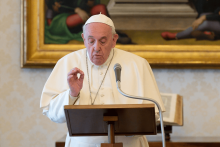
In a seven-point preface to the decree explaining why action was needed now, Francis said the pandemic "has negatively affected all the sources of income of the Holy See and the State of Vatican City."

THE TREATY ON the Prohibition of Nuclear Weapons, the first global ban on nuclear weapons, entered into force on Jan. 22. It is a bright spot in a bleak international landscape.
Negotiated by about two-thirds of the world’s nations, the treaty represents a remarkable step toward the complete elimination of nuclear weapons. Civil society, including faith communities, played a significant role in establishing the treaty and now can work to advance its reach—including persuading the United States to join. The Holy See, one of the first states to ratify the treaty, described it as “one more blow on the anvil toward the fulfilment of the prophecy of Isaiah: ‘They shall beat their swords into ploughshares and their spears into pruning hooks.’”
The treaty bans all countries from developing, testing, producing, manufacturing, transferring, possessing, stockpiling, threatening to use, or allowing nuclear weapons to be stationed on their territory. It also prohibits countries from assisting, encouraging, or inducing anyone to engage in any of these activities and requires signers to take certain proactive measures to implement the accord.
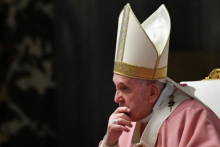
The ruling was a response to practices in some countries where parishes and ministers have begun blessing same-sex unions.

WHEN WE SAY that “humans are heating up the planet,” we are technically correct, and yet misleading. Humans are indubitably driving climate change—but only some of us.
An Oxfam study released this fall showed that between 1990 and 2015—a period when we poured more carbon into the atmosphere than in all of history before that time—the richest 1 percent of humanity accounted for more of that damage than the entire bottom 50 percent of the species. In case you think that the top 1 percent is Jeff Bezos and Bill Gates, remind yourself that in fact it’s anyone whose income tops $109,000 a year—that includes plenty of readers of this magazine. The richest 10 percent of humanity accounts for half of total emissions—that’s everyone whose income is above $38,000. That’s quite likely you; it’s certainly me.
These people are scattered around the world, though the biggest concentrations are in the U.S., the EU, China, and the Middle East; India is appearing in the league tables too, a reminder that inequality is as much a problem within nations as between them. But what’s really sad, of course, is that anyone with a decent income is able to insulate themselves from most of the problems they’re causing. It’s people in poverty—whether in the Lower Ninth Ward of New Orleans or along the delta of the Brahmaputra in Bangladesh—who get hit first and hardest.